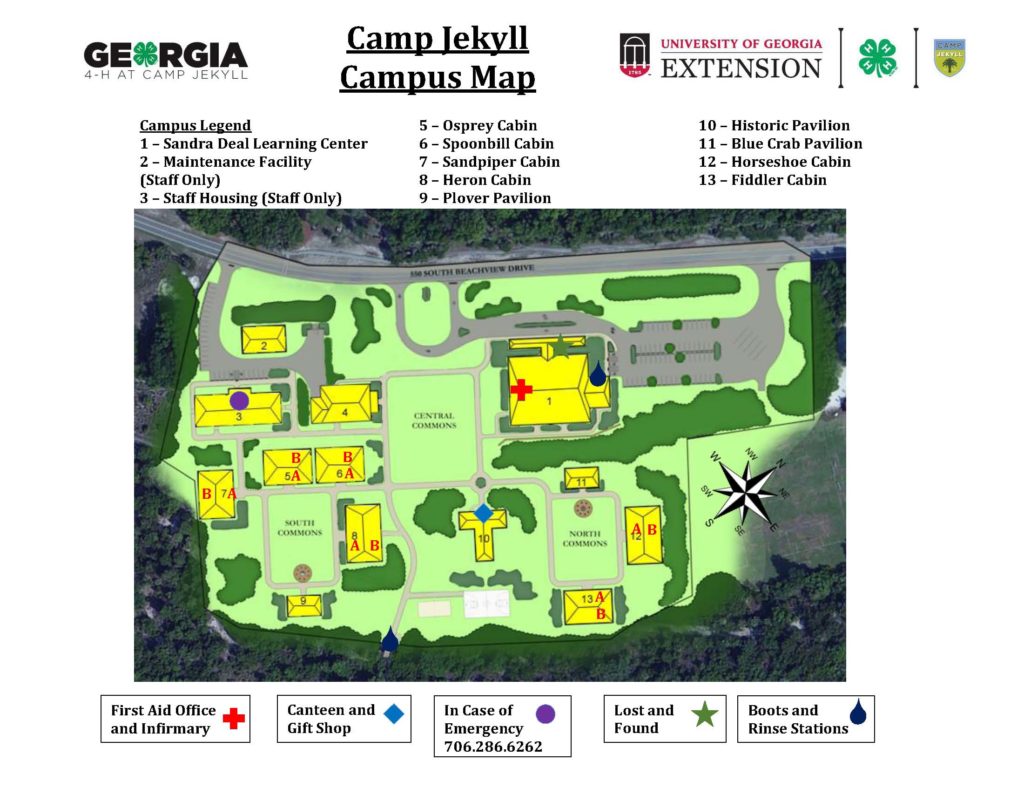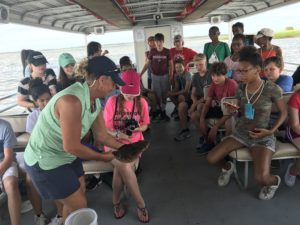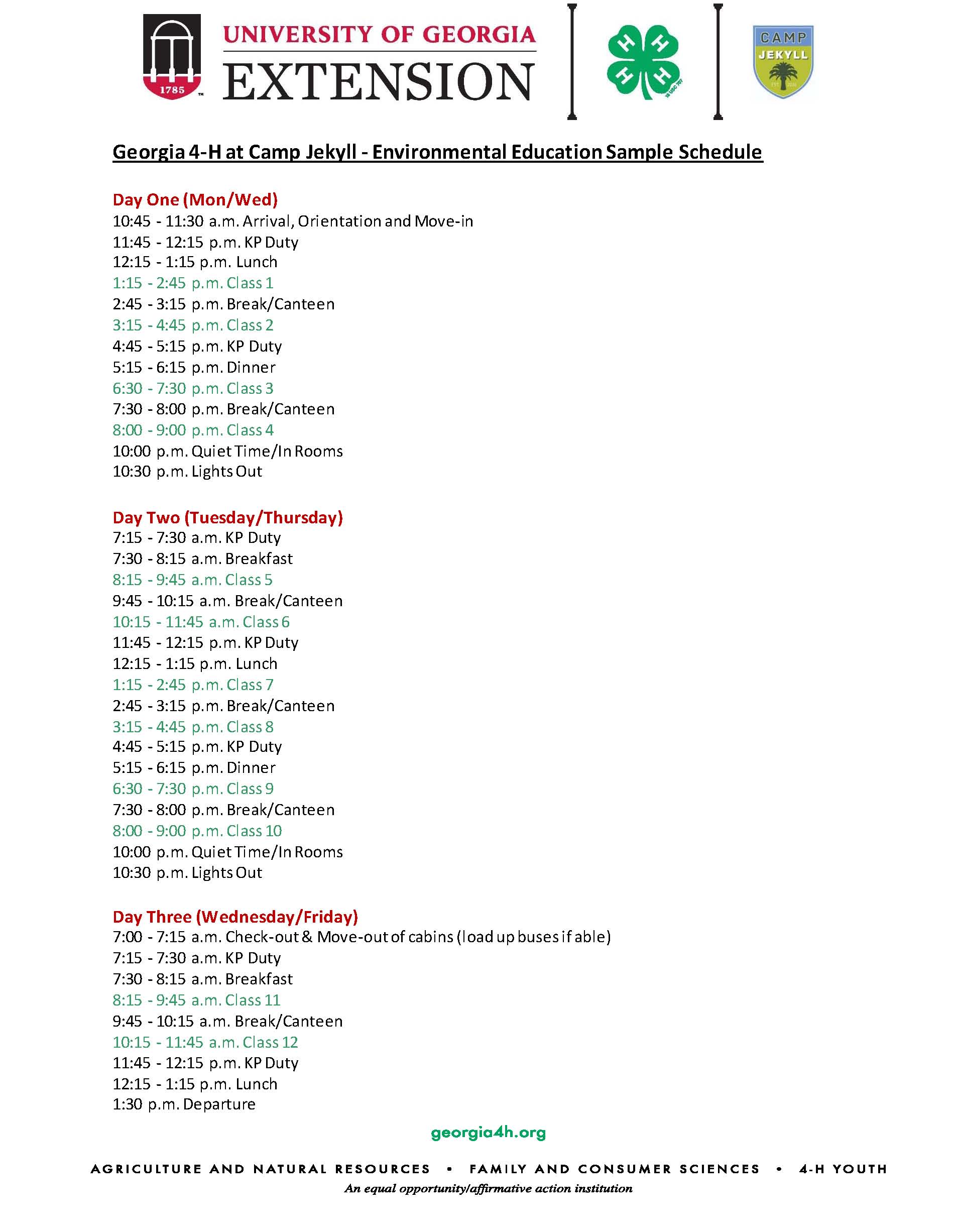The Georgia 4-H Environmental Education Program at Camp Jekyll encompasses many aspects of the marine environment, is aligned with the most current Georgia state curriculum and standards, allows students to be active participants in the learning experience, and encourages teacher-student interactions in an atmosphere much different than the traditional classroom. Thank you for taking the time and effort to share this unique learning experience with your students. It requires a great deal of work to put the field study together, but when you see a child grasp a concept and enjoy learning, you’ll know it was all worthwhile. We are excited to work with you to plan your field study. Please take time to read this planner and contact us as we can be of assistance to you. We’ll see you at the beach!
Please give us a call at 912.635.4117 or email gkkosik@uga.edu to reserve your
GA 4-H Environmental Education field study!
Welcome to Georgia 4-H Environmental Education
As one of the nation’s largest providers of residential environmental education, the Georgia 4-H Environmental Education Program invites your school to join the safe haven of Georgia’s Outdoor Classroom. Operating September through May of each year, Rock Eagle, Wahsega, Fortson, Jekyll and Tybee provide sites throughout the state for quality field study residential experiences. Researchbased curriculum correlates to Georgia’s Quality Core Curriculum and Georgia Performance Standards, providing hands-on learning in the real world. Endorsed by the Georgia Department of Education and in compliance with the time-on-task ruling, the Georgia 4-H Environmental Education Program is operated by the University of Georgia Cooperative Extension.
Georgia 4-H Mission Statement
To assist youth in acquiring knowledge, developing life skills and forming attitudes that will enable them to become self-directing, productive and contributing citizens.
Georgia 4-H Vision
A world in which youth and adults learn, grow and work together as catalysts for positive change.
Georgia 4-H Environmental Education Objectives
• To develop an awareness, knowledge and appreciation of the environment
• To cultivate curiosity, critical reasoning and evaluation
• To develop positive relationships among students and teachers
• To make the school program more meaningful by applying knowledge and skills acquired in the classroom to real life situations
• To provide experiences in using scientific processes, such as observing, measuring, and classifying
• To develop self-confidence and physical fitness
• To develop appreciation for the local and natural history of an area
Forms and Documents
• Class Selection Form (Online Qualtrics Version)
• Dietary Restriction Form
• Campus Map
• Sample Menu
• Student Journal Questions for EE Classes
• Sample Schedule
• Cabin Layouts (32-Bed Cabin and 64-Bed Cabin)
• Gift Shop Bulk T-shirt Order Form (updated form coming soon)
• Gift Shop Bulk Reusable Water Bottle Order Form (updated form coming soon)
• What to Bring List
Information for Home School Educators
The number of homeschool parents contacting us regarding programs offered at Camp Jekyll increases yearly. Parents want their children to have the same great learning experience so many other students enjoy. The Georgia 4-H EE Program welcomes homeschool groups and this article will explain how to make the most of a field study to Camp Jekyll.
Camp Jekyll serves about 11,000 students yearly. We offer programs from grades one through college. We have provided programming for many homeschools as well as all types of public and private schools. We fill up early, esp. for late spring and early fall but our season runs from mid. Sept through late May with a short break around Christmas. We have many groups that only want January dates and prefer the colder weather for teaching. Our Center can house 256 people so there will be other schools on site. Your group will have their own cabin and teaching group(s). We treat homeschool groups like any other school group. Once you are on the books we will send a contract. Within 2 weeks of receiving a contract we ask for a $300 non-refundable deposit. You will be contacted several weeks before you visit to finalize numbers and put your schedule together.
Here are some important points to help you plan your study:
• Camp Jekyll must have 20 people (adults and students) to open up a cabin, or the group must pay for 20 participants. All people attending pay for programs, meals and lodging.
• As the lead teacher we recommend getting a deposit from the other families early. Homeschools often drop numbers and there is a penalty fee if numbers drop too much. We appreciate one check from the group, not separate checks from each family. We do not accept credit cards.
• As lead teacher you will plan the classes. We aim for 14 people in a group but if you bring 18 or so folks we can have a younger and older group. They do not have to take the same classes. You may bring up to 256 folks but most homeschools are much smaller.
• We do not encourage children under five years old attending. We are outside all day and have evening activities so it makes a long day for real young children.
• Our cabins consist of two areas joined by a connecting door (think of adjoining hotel rooms). Each side of the cabin has two adult lodging rooms and one youth lodging area. The cabins have a/c and heating and each sleeping area has its own bathroom. We will provide you with enough cabin space for your males and females to have separate sleeping areas but if you wish to put families in single cabin area that is fine.
• Please check out the website to see a sample schedule. You may elect to miss the first lunch or last lunch as a group and there will be a reduction of price. We assume all other meals will be eaten by the entire group. We cannot subtract a meal for just a few people.
In speaking with many other successful homeschool participants the hardest part is getting the group together right in the beginning. If you are doing the planning, try to get a commitment and deposit early. Arrange to car pool or at least have a firm arrival time so meals and classes go as planned.
Okay, it sounds like a lot of work but it is well worth it when you see your family learn and enjoy all the experiences that Jekyll has to offer. The students love riding our mini-buses and eating in the dining hall. You will love watching learning come alive in our outdoor classroom. Please call Greg at (912) 635-4117 to plan your study.
Letter of Support from a Fellow Educator

Medlock Bridge Elementary
Margaret Pupillo, Principal
Deborah Pernice, Assistant Principal
Our mission is to educate and inspire all students to be lifelong learners.
November 28, 2005
Jekyll Island 4-H Staff,
The Medlock Bridge Elementary 5th grade teachers, parents, students and administration would like to express our appreciation for your program. Every aspect of the three day experience is well organized. Each lesson and field experience is prepared and delivered by an enthusiastic, knowledgeable staff member. The food is delicious and the accommodations clean and comfortable. You have even helped us out with students that need a special diet. We appreciate the detailed schedule and room information you provide. Our teachers and parent chaperones know at all times where to be and what to do. Every year our 5th grade parents vie for an opportunity to chaperone this trip because previous chaperones spread the news of the wonderful experience. We eagerly await our next visit in February and look forward to many years of learning with you.
Sincerely,
Debbie Doyle
Curriculum Support Teacher
Fulton County School System
10215 Medlock Bridge Parkway
Alpharetta, GA 30022
phone (770) 623-2980
fax (770) 623-2988.
Fees and Rates
ALL FEES ARE ASSESSED PER PERSON. THIS INCLUDES ALL ADULTS (TEACHERS AND CHAPERONES) AND STUDENTS.
Overnight Fees
Lunch to Lunch Program (Mon. – Wed. or Wed. – Fri.) = $170.00 per person • Includes 2 nights lodging, 7 meals, & 12 educational programs: • 8 day programs @ 1.5 hrs each (7 taught by Jekyll staff, 1 taught by visiting school) • 4 evening programs @ 1 hr each (2 taught by Jekyll staff, 2 taught by visiting school)
Sunday evening to Wednesday Lunch = $212.00 per person • Includes 3 nights lodging, 8 meals, & 14 educational programs: • 10 day programs @ 1.5 hrs each (9 taught by Jekyll staff, 1 taught by visiting school) • 4 evening programs @ 1 hr each (2 taught by Jekyll staff, 2 taught by visiting school) • No meals and no education programs offered by Jekyll staff on Sundays. • Sunday arrivals must have a one hour arrival time window. • Activities and supervision on Sundays are the responsibility of visiting school.
Other options may be available, call reservation contact for more information!
If a group experiences any last minute drops in numbers, the only charge assessed will be a $10/pp processing drop fee; the balance of the trip cost will be refunded for these no shows.
Day-Use Fees
Day programs are scheduled, when space permits, around residential groups. The cost for an hour and a half program is $15.00 per person and $10.00 each for any additional classes. We charge all individuals participating in the program (students, adults, and teachers). Because of limited staff and space, day groups may not be scheduled at all times of the year. Please call for availability.
Special Services
Accessibility
Please do not let a disability keep anyone from attending our program. We have accessible sleeping rooms as well as access to beach wheelchairs for use by visiting groups. If anyone in the group has special needs, we are glad to do what we can to accommodate them. However, please realize that a great portion of our programming takes place outdoors, and not all natural areas are accessible. If you have questions about whether certain special needs can be met, don’t hesitate to call or schedule a visit to our center.
Custom Food Services
Our kitchen manager, Monica Heys Wannacott, is an experienced food service provider. We make every effort to accommodate our visitors with special dietary needs. However, in certain cases, a student may need to provide their own food. We can offer assistance in the storage and preparation of foods brought in these circumstances. We also appreciate advanced warning of any special dietary needs. You can see what a sample menu looks like; however, these are only examples of food served and not a guarantee of food provided for any particular day or visit.
Prayer or worship services
We can work with you to schedule times and provide space for religious services. To avoid scheduling conflicts with other groups, mention these needs to the reservation contact when you make class selections.
Trash & Recycling
We ask that all visitors help keep the center clean and litter free. We schedule center-wide clean ups if necessary and may even close canteen as an incentive to clean. Because we recycle cans and plastic bottles, we also ask that participants make extra efforts to bring these items to the recycling recetacles located outside the Learning Center, Historic Pavilion, and Dining Hall.
Lost & Found
We have a lost and found area located in the front of the Learning Center. We encourage students to be responsible for their own materials. Items left behind after groups leave are kept for short periods of time and are then donated. Unfortunately, we are unable to mail back lost items unless the owner supplies the postage. Lost items of value that are found and given to staff are held in the Program Coordinator’s office. *Georgia 4-H is not responsible for lost or stolen items.*
Emergency Procedures
First Aid Station
Camp Jekyll does not provide an on-site nurse and we strongly recommend that each school bring appropriate first aid supplies. Minor incidents can be treated in the infirmary located in south corner the Education Center (closest to Historic Pavilion). An adult must accompany a student to the infirmary. You must check your students medical forms and/or call parents before dispensing first aid supplies. Please sign our Injury Report Form and Medication Log located on the clipboard in the infirmary.
Medication/Permission Slips/Medical Insurance
Visiting teachers and/or school nurses are responsible for keeping up with student medication. Refrigeration can be provided if necessary for medication. Visiting teachers are also responsible for keeping up with school required permission slips. Jekyll will not collect these for each child. Jekyll is not responsible for your group’s medical insurance. Inexpensive insurance may be available through your local Extension Office.
Accidents and Illnesses
The Jekyll staff is not authorized to treat illnesses or accidents. We strongly recommend that an adult with your group drive a vehicle to Jekyll that can be used to transport individuals in the event of an emergency. We do have a local 911/EMS service that can send ambulances to respond to emergencies. In case of an extreme home emergency after hours, your school can contact the Georgia State Patrol at (912) 635-2303; the patrol can relay a message to the center. During regular office hours, messages can be relayed through the Camp Jekyll main office at (912) 635-4115 (or 4117).
Fire
The fire alarm would alert individuals of a fire. All people would be evacuated from the building. No one would be allowed re-entry into a burning building.
Weather Issues/Lightning
Jekyll runs classes rain or shine. The most comfortable participants are those that are prepared with ponchos, rain jackets, hats, and/or rain pants. In the event of lightning, we will move classes indoors until we haven’t seen lightning for at least 15 minutes. In sudden sever weather emergencies, move inside as quickly as possible (take cover) and stay away from windows and appliances. If you are trapped outside, avoid tall trees and open fields, and lie flat in a ditch if necessary.
Missing Persons
It is the responsibility of the visiting adults to maintain group counts. Notify a Jekyll staff member if an individual is missing ASAP.
Field Study Planning Checklist
ο Make reservations with Georgia 4-H EE Program at Camp Jekyll
ο Send signed contract and deposit to Jekyll 4-H to confirm reservations
ο Collect deposits/partial payment from all students who plan to attend
ο Make transportation arrangements
ο Announce the parent meeting & hand out meeting notices
ο Hold parent meeting & distribute parent letters, handouts, and permission slips
ο Collect all permission slips &/or partial payment
ο Choose classes and send this information to Jekyll 4-H
ο Notify Jekyll 4-H of any special needs/accommodations such as dietary restrictions
ο Choose adult leaders (school staff only or school staff/parent chaperone mix)
ο Collect final payment from participants
ο Send t-shirt order and sizes to Jekyll 4-H (if pre-ordering bulk purchase)
ο Make teaching group assignments (as evenly as possible; aim for no more than 14 total students/adults per group)
ο Make cabin assignments
ο Make KP assignments (program coordinator will let you know how many students are needed for each meal)
ο Prepare for teacher-led classes and gather any necessary supplies (such as campfire)
ο Finalize transportation arrangements
ο Make name tags (helpful for chaperones and Jekyll 4-H staff)
ο Hold chaperone meeting and distribute chaperone packets
ο Review directions and travel time to Camp Jekyll (provide a buffer of time for unexpected travel delays!)
ο Have school/system business office cut final check and bring to field study
ο Load buses & take roll at departure time
ο Provide travel updates to Jekyll 4-H if running early/late
*Be sure to delegate responsibilities where and when appropriate!
Class Listings and Descriptions
Camp Jekyll Field Study Course Catalog
Class Listings and Descriptions are divided into Day (Core and Electives) and Evening sections. Within these sections, classes are grouped by ‘Jekyll-led‘ or by ‘Teacher-led‘. When you select your classes, the number of classes and types you choose will depend on the length of your stay. Please contact us for more information and for help deciding which classes to select for your field study.
Day Core Classes* (led by Jekyll 4-H Staff)
*These three classes are required .
| Beach Ecology: Examines barrier island dynamics, erosion, and accretion. Other topics include the organisms that are found on the beach, importance of the dunes, and dune plants. | |
| Maritime Forest Ecology: A study of the process of succession from the beach into the mature maritime forest. Class also includes discussion of major animals and plants, the importance of freshwater sloughs, and decomposers of the forest. | |
| Salt Marsh Ecology: A study of the salt marsh. Concepts include major plants (Spartina), marsh animals (fiddler crabs, mussels, and birds), zones of the marsh, additional concepts such as food webs and tides are discussed. This is an off-site class. |
Day Electives (led by Jekyll 4-H Staff)
| North End Study: Students will compare and contrast the north end and south end beaches. Discussions focus on the accretion and erosion patterns (constructive and destructive forces), human impacts, and coastal concerns. This is an offsite class. | |
| Dock Study: Students will use dip nets to collect and study organisms from the fouling community at the dock. They will examine their finds under microscopes in our lab. This is an off-site class. | |
| Shark or Fish Dissection: Students will dissect spiny dogfish shark (27+ inches) or a white perch (9 inches) to learn about the biology and anatomy of this animal. We recommend 4 specimens per teaching group. Please schedule this class at least 3 weeks in advance of the trip to allow enough time to order the sharks. There will be an additional fee of $20.00 per shark and $12.00 per fish to cover the cost and supplies. Please note specimens are occasionally backordered and subject to price increases. | |
| Herpetology: A hands-on study of amphibians and reptiles including adaptations, misconceptions, etc. Emphasis is placed on indigenous species of the southeast. | 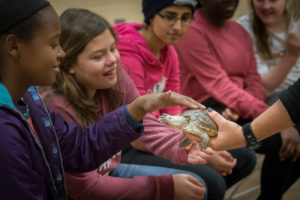 |
| Orienteering: A study of the magnetic compass, its design and use. Students will pacing and how to estimate distance and then will navigate an orienteering course using their new knowledge of compasses and pacing. | 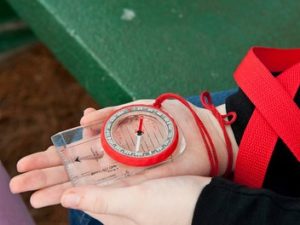 |
| Ornithology: A study of birds using binoculars and field guides. Emphasis is placed on coastal birds and their adaptations and behaviors. This is an off-site class. | 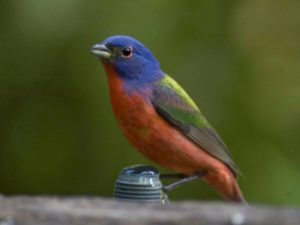 |
| Saltwater Fishing: Students will experience saltwater surf fishing firsthand with their own rod and reel! This class is the product of a collaborative effort between Jekyll 4-H and the GA DNR. All gear and bait provided. This class is complemented with an evening Jekyll-led class that introduces students to fishing, including skills and sustainable catches. Both day and evening classes must be selected together. School size needs to be 80 or less due to time/gear limitations. There is an additional charge of $1 per person (student/adult) to help cover the cost of bait and gear. Recommended for groups 6th-8th grade (anyone 16 or older needs a GA fishing license). |  |
| Seining and Nets: Students will use a seine net to capture organisms in the surf. Concepts include animal adaptations and identification. Offered mid-March to October. We do not go seining when there is any sort of advisory in the ocean (rip current warning, high surf advisory, etc.). A back-up class may be necessary even during warmer months. | 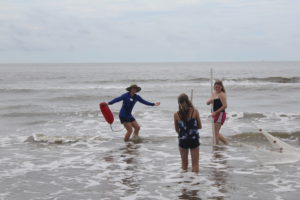 |
| Slough: An exploration of local freshwater sloughs. Students will discuss the differences between salt and fresh water systems, conduct a biological sample (collecting and identifying organisms), and will conduct physical and chemical water analysis such as temperature, pH, DO, salinity, and turbidity as time allows. This is an off-site class | |
| Coastal Geology: Investigate the origins of sand and how sand grain size influences the beach. Students then survey and measure the Jekyll beach from the primary dune to the water. Skills used in this class include measurement, geography, map reading, and graphing. Not recommended for students below 4th grade; Students need to have basic graphing skills. |
Teacher Led Day Classes (led by visiting school staff)
| Biking: Tour Jekyll Island by bike! This class is best offered in smaller groups ~15. Please note that school transportation required. Choose from two bike rental providers: – Jekyll Island Authority (6-29 persons $7.50 and 30+ persons $6.50). Tax exempt documentation required. Payment in the form of single check. – Barrier Island Bikes ($5 per person). |
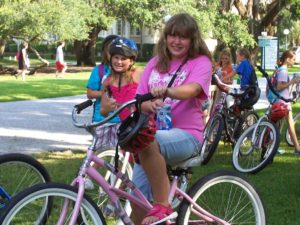 |
| ECO Boat Tour: Explore the estuary by boat while enjoying a dolphin tour and trawl. Boat leaves from the Jekyll Island Wharf (*new pricing structure as of 9/27/2022* flat rate of $600 for any size of group up to a maximum of 48 passengers per boat. old pricing structure: $15 per person with a minimum of 30 persons up to 49 persons; $450 minimum per boat tour). Check out the Jekyll Island Boat Tours website for more information. A separate check must be made out to Jekyll Wharf Marina. School transportation required. | 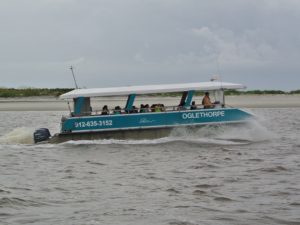
|
| Canoeing: Take your students for a trip around the pond at 4-H Tidelands Nature Center by canoe. This class is best for smaller groups (less than 50 total). A separate check must be made out to Tidelands Nature Center ($9 per person). School transportation required. | 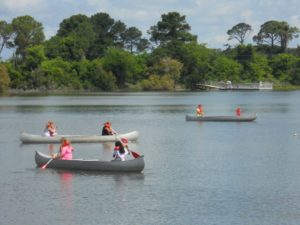 |
| Explore the Beach (PDF): A beach walk that allows for discovery, sand sculpture, and review of concepts previously covered in other classes. Curriculum includes scavenger hunt. This class must be organized to avoid disrupting other classes being held. | 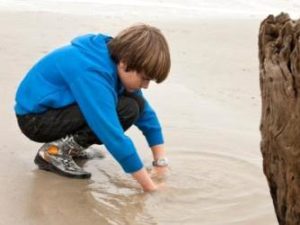 |
| Fort Frederica: Explore a historic British fort located on St. Simons Island. The fort is approximately 1/2 hour from Jekyll Island, so this trip takes two class slots. Admission is free. School transportation required. | 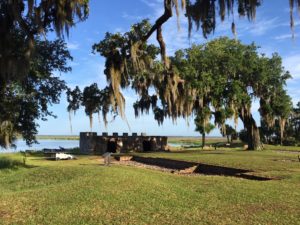 |
| Georgia Sea Turtle Center: Explore Georgia’ only research, rehabilitation, and education center devoted to Sea Turtles. The center is located in Jekyll’s historic district, and school transportation required. Choose from one of several programs. Due to ongoing renovations to the GSTC classroom, only guided tours are available from now until October 2024. The guided tour consists of a 45-minute educator-led tour through the Learning Center with a guaranteed presentation in our rehabilitation pavilion. The price is $18/participant, before tax. No more than 50 persons can be accommodated on a guided tour, and there are no restrictions on the number of adults who can join on the guided tour as long as they are included in the participant count on the reservation form, and the total participant count does not exceed 50. Please note that the GSTC requires 30 days advance completion of their required reservation forms for booking a tour. | 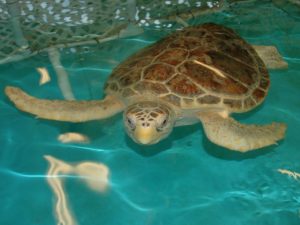 |
| Historic District: Explore the history of Jekyll Island on a tram tour of the historic district (20 person minimum). A separate check must be made out to Jekyll Island Museum [$10.00 per youth (1 adult per 10 youth is free); $15 for any additional adults]. Payment due 1 week in advance of trip. School transportation required. | 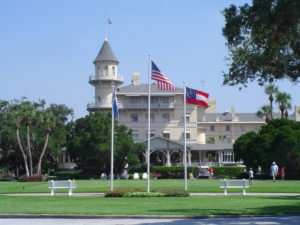 |
| Journals: Allow for supervised time for journal writing and reflection. Use the journals questions we provide or develop your own. | 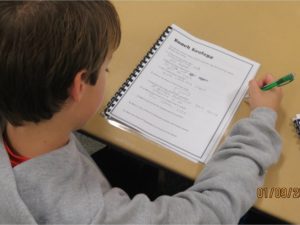 |
| Organized Volleyball/Games: The center will provide volleyballs and basketballs for use in supervised games. | 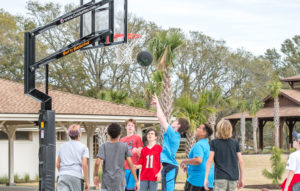 |
| “On-the-Spot” (PDF): Have students tackle various physical and mental problem-solving challenges done in large or small groups. We provide some equipment (or bring your own) to encourage students to think logically and cooperate as a group. | 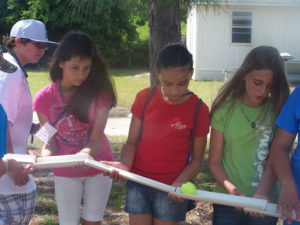 |
| Mermaids and Manatees (PDF): This creative activity promotes observation and communication skills. Students describe and draw strange and unfamiliar sea creatures. Some materials are available. | 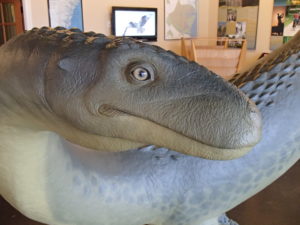 |
| Tidelands Nature Center: Visit our very own nature center that has live animals, touch tanks, and exhibits. Students can enjoy a leisurely stroll or our nature center staff can lead a herpetology program featuring Tideland’s own reptiles and amphibians. A separate check must be made out to Tidelands Nature Center ($10.00 per person for walk-through and a herpetology/dock study/other program program). School transportation required. | 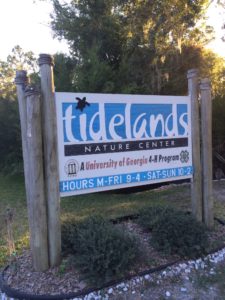 |
Evening Electives (led by Jekyll 4-H Staff)
| CSI Cetacean: Students will perform a mock necropsy on a “stranded dolphin” and complete a necropsy data sheet. Students will also present their findings and offer a hypothesis as to the cause of the stranding. Several teaching groups may be combined for this class. Not recommended for students below 7th grade. | 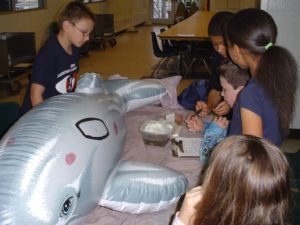 |
| Endangered Species: Students explore the causes and consequences of the loss of plant and animal species, and how individuals can make a difference. Includes a “Jeopardy” style review game. This is a large group, lecture-style class. | |
| Environmental Issues: New Class! Students learn about the idea of common property resources and the idea of the tragedy of the commons. Students examine the role of resources managers and what is involved in a stock assessment. Activities include using a dichotomous key and determining the maximum sustainable catch for a fishery. Several teaching groups may be combined for this class. | |
| Fish Kits: A creative look at fish adaptations and characteristics. Several teaching groups may be combined for this class. | |
| Marine Mammals: A look at the marine mammals of the southeast, including whales, dolphins and the manatee. This is a large group, lecture-style class. | |
| Invasive Species: Students explore the characteristics and consequences of invasive plant and animal species, and how these species can be managed. Students are divided into various interest groups and discuss management of a new invasive species on Jekyll. | |
| Night Walk: A quiet walk done in teaching groups incorporating various sensory activities and beach exploration at night. Astronomy may be added if conditions are favorable. | |
| Saltwater Fishing: This class introduces students to fishing, including skills and sustainable catches. This class is the product of a collaborative effort between Jekyll 4-H and the GA DNR. This class is complemented with a day elective where students will experience saltwater surf fishing firsthand with their own rod and reel! All gear and bait provided, no additional cost. Both day and evening classes must be selected together. School size needs to be 80 or less due to time/gear limitations. Recommended for groups 5th-8th grade (anyone 16 or older needs a GA fishing license). | |
| Sea Turtles: A look at the life of a sea turtle with attention given to understanding current issues. This is a large group, lecture-style class. | 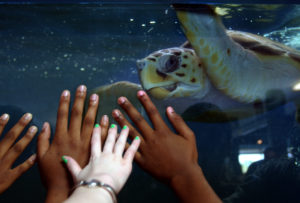 |
| Sharks: An enlightening discussion of sharks concerning general adaptations and common misconceptions of these animals. This is a large group, lecture-style class. | |
| Snakes: Students will receive a hands-on experience with snakes, while learning conservation issues. The class will also discuss snakes indigenous to southeast Georgia and common misconceptions, physical characteristics, etc. Several teaching groups may be combined for this class. |
Teacher Led Evening Electives (led by visiting school staff)
Depending on the electives you choose, and the number of days that you stay, you will be required to teach day and evening classes from the following options. Free Time is not an option. Please feel free to discuss other ideas with the programming staff.
| Campfire: We set up the fire, you light it and entertain your students. Sing songs, tell stories, or roast marshmallows. Please bring your own roasting sticks and supplies. Fire ring reserved on a firstcall, first-served basis for evening slots. Please note, during dry weather, the island issues fire bans and we are forced to cancel campfires. Please have a backup plan in mind. | 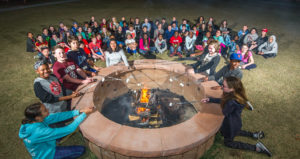 |
| Gyotaku (PDF): Make your own fish prints. We supply the rubber fish models, you supply the paint and printing materials. | |
| Journals: Supervised time for journal writing and reflection. Use the journals questions we provide or develop your own. | |
| Mermaids and Manatees (PDF): This creative activity promotes observation and communication skills. Students describe and draw strange and unfamiliar sea creatures. Some materials are available. | |
| Mini-Golf: Enjoy playing a round of putt putt here on the island! Group size of 11-29 persons is $4/pp and 30+ people is $3.50/pp). Tax exempt school documentation is required and payment must be in the form of a single check. School transportation required. | |
| Night Walk: Explore the beach at night. No flashlights permitted on beach during turtle season. This class will need to be organized to avoid interfering with other night walks. | |
| Ocean Bingo (PDF): Get students thinking about the variety of life in the ocean. Students will use listening and puzzle-solving skills to figure out the bingo clues. | |
| “On-the-Spot” (PDF): Have students tackle various physical and mental problem-solving challenges done in large or small groups. We provide some equipment (or bring your own) to encourage students to think logically and cooperate as a group. | |
| Organized Volleyball/Games: The center will provide volleyballs and basketballs for use in supervised games. | 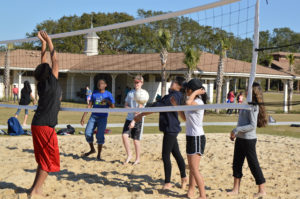 |
| Sand Sculptures: Plan a theme and bring any materials you may require. Care must be taken to flatten structures during turtle season. | 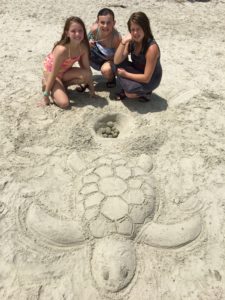 |
| Talent Night: Skits, songs and other creative acts are presented by visiting students and/or adults. |
Student Journal Questions for EE Classes
All Classes (Questions Only)
Journal Questions
Core Classes (Key Words Defined and Journals Questions Answers)
Beach Ecology
Salt Marsh Ecology
Maritime Forest Succession
Class by Class Preparations
When considering what clothes to pack and wear during your field study, we recommend having the option to dress in layers no matter the time of year since they can keep you warm in cooler months, keep you shielded from the sun any time, and keep you protected from biting insects. What you find below are some specific suggestions related to each individual class. You can also visit our How to Book Your Group – ‘What Month Is Best?’ page for more information about what Jekyll is like during different seasons. Also make sure to visit our ‘What to Bring’ page for general tips on packing for your field study.
| Class | Suggested Dress / Preparation |
| Beach Ecology | This class is taught almost entirely on the beach. During warmer months, it is important to protect yourself from the sun (including sunscreen, hat, sunglasses, clothing, etc.). During cooler months, a jacket and/or windbreaker helps keep you warm. This class does not permit entry into the ocean, so clothes should remain dry but shoes may get wet while walking along the surf. All items will inevitably get sandy. |
| Maritime Forest Succession | This class is taught both on the boardwalks leading to the beach and on the dirt trails winding through the maritime forest. See above for hints about appropriate dress for the beach environment. Bug repellent and/or long pants and long sleeve shirts can make the time spent in the maritime forest more comfortable by providing respite from biting insects. |
| Salt Marsh Ecology | This class is taught primarily in the marsh. There are marsh boots onsite available for borrow but selection of larger size boots may be limited. Otherwise, shoes that can get wet and/or muddy and that will stay securely on your feet are a must. Also wear old enough clothes that you won’t mind exposure to marsh mud so that you can enjoy your experience. Again bug repellent and sun protection are important for this class. |
| Surf Fishing | This class takes place on the beach. This class does not permit entry into the ocean, but will take place near the surf. During warmer months, it is important to protect yourself from the sun (including sunscreen, hat, sunglasses, clothing, etc.). During cooler months, a jacket and/or windbreaker helps keep you warm. Shoes will certainly get wet and sandy (clothes may as well). |
| North End Study | This class is taught at various beach sites on our island including Driftwood (or Boneyard) Beach. Information in the beach and the forest descriptions would apply to north end class. |
| Dock Study | This class is taught about half of the time out at creek side dock structure and the other half of the time indoors back in the lab. Bug repellent may be necessary certain times of the year as can layers of clothes. Clothes and shoes should not get wet or dirty. |
| Fish/Shark Dissection | This class is taught inside in a classroom and dissection lab in the Education Center. Gloves are provided and protective eye-wear is available upon request . Clothes should not get dirty but preservative smell may linger on clothes. |
| Herpetology | This class is taught indoors, so just dress comfortably. |
| Orienteering | This class is taught outdoors on campus. Bug repellent and sun protection are important things to consider. |
| Ornithology | This class is taught outdoors at a birding pond in the maritime forest and a small amount of time may be spent indoors in our bird lab. Insect repellent and layers of clothes can make you more comfortable depending on the time of year. |
| Seining & Nets | This class is taught outdoors and participants will get wet! Shirts and shoes (with a back strap) are required at all times. Participants will enter the ocean up to their knees with waves slashing up to their waists, so clothes and shoes that can get wet are essential. It is also important to consider sun protection in this class. Rubber boots are not recommended. |
| Slough Study | This class is taught at a freshwater slough located within walking distance in the maritime forest. Bug repellent and layers of clothes are important. Also, shoes that can get dirty or wet are a good idea as we sample at the edges of sloughs which can be muddy. |
| Coastal Geology | This class is taught both indoors and outdoors, with about half of the time spent in the geology lab and about half of the time out on the beach. See tips for beach class above. |
| Night Walk | Because this class is taught in the evenings typically after sunset, it is important to prepare for changes in temperature. Layers are especially important in this class so you are comfortable as temperatures can cool quickly on the beach in the evening. Bug repellent may also be useful during certain times of the year, especially when there is little wind on the beach. |
KP Schedule and Assignments
You will be asked to provide a certain number of KP (“kitchen patrol” or “kitchen party”) students to each meal based on your total number of participants. We will inform you of the number of students to provide and the times they are needed in the schedule packet that is emailed to you. We usually ask for only 2-6 students per meal. Please send only the number requested – extra KP students will not have a job and ‘many hands doesn’t always equate to light work!’. KP students arrive early to set up and stay late to clean up for each meal. Each student should only have KP once to allow others the chance to participate.
Example:
Tuesday KP Assignments and Schedule
Breakfast (7:00 AM -8:15 AM)
1.
2.
3.
4.
5.
6.
Lunch (11:45 AM -1:15 PM)
1.
2.
3.
4.
5.
6.
Dinner (4:45 PM – 6:15PM)
1.
2.
3.
4.
5.
6.
*Not all assignments may be needed depending on number of schools onsite/KP requested and KP may finish early if all responsibilities completed
Cabin Layouts and Floor Plans
The cabins available to your group will be assigned prior to arrival by Jekyll staff and will be included in your lead teacher packet. Please plan to maximize beds in each sleeping area (the number of beds in each area is indicated on the cabin layout). Please note that cabins have youth sleeping areas and adult sleeping areas (although students can be assigned to adult sleeping areas and adults assigned to students sleeping areas as needed). Camp Jekyll has 6 cabins that will sleep 256 participants (two x64 bed cabins and four x32 bed cabins). Cabin floor plans are available in the ‘Downloads Folder’.
Teaching Group Assignments
Group leaders will be told the number of teaching groups and names of your groups on the schedule that is sent to you. Your number of teaching groups is determined by the total number of individuals (students and adults). Please plan to have no more than 14 people (students and adults) per group; this is the maximum number we can transport in our vehicles. Every group must have at least one adult. If you have extra adults and your total number per group is over 14, then please arrange for additional transportation to follow behind our mini buses. Try to divide your groups as equally as possible; this is greatly appreciated by our instructors and helps with group management and allocation of teaching resources. Please also be sure to let students know ahead of time what teaching group they have been assigned as this will help expedite orientation when groups are shown where on campus their group meets for class.
Canteen and Gift Shop
Groups may choose to purchase canteen items in bulk for students or allow students to make their own purchases. Either way, our counter sales (canteen and gift shop) opens three times a day (in between morning, afternoon, and evening classes). Bulk purchases may be covered by a separate check from the school made out to “Camp Jekyll”; bulk orders need to be placed approximately one month to ensure availability. Bulk orders of t-shirts and water bottles ensure all sizes are available and make for convenient distribution. We are able to accept cash and personal checks only; we cannot accept credit/debit cards at this time. The stock in canteen is rotated from time to time, so items are subject to change. Also, our canteen rules are that students can buy only one candy item per canteen visit. Students are not allowed to buy caffeinated beverages (coke and diet cokes are for adults only). If you have any additional rules you wish for your students, please let us know and we will try to accommodate. Students may not have food or drink in their cabins. Please make sure to encourage students to recycle and dispose of all trash!
"What to Bring" List
You will find a general packing list below (printable version). We recommend bringing a rolling luggage bag to make luggage transport easier across campus. Please adjust clothing as needed based on the season you are visiting. For a more specific list of how to be prepared for individual classes on your schedule, visit our Class by Class Preparation page.
Items to Bring:
-Raincoat and/or raingear
-Sweater/sweatshirt
-Jacket (including gloves, scarf, warm hat, etc. if cold)
-Combination of long sleeve/short sleeve t-shirts (at least 1 per day)
-Combination of long pants/shorts (at least 1 per day)
-Socks (3-5 pairs)
-Closed toe shoes (at least 2 pair of shoes – one to get wet, one to stay dry)
-Sandals with a heel-strap (crocs worn with heal strap are allowed)
-Shower shoes for wearing in bathroom and showers
-Hat/cap/visor
-Pajamas
-Linens, blankets or sleeping bag – mattresses are twin size (Linens are NOT provided at camp)
-blanket (during winter months)
-Pillow
-Plastic bag for dirty clothes
-Bath and/or beach towels and washcloths
-Toiletries (hand soap, toothbrush, shampoo, deodorant, etc.)
-Roll-on or lotion insect repellent
-Sunscreen
-Lip balm/ChapStick
-Water bottle
Optional Items:
-Day pack or backpack
-Camera and/or film
-Binoculars
-Sunglasses
-Rubber boots for marsh trip (a selection of old donated marsh boots are available to borrow but sizes and numbers of boots in various sizes vary greatly – adult sizes are especially limited)
-Money for canteen / gift shop (~$20 in small bills)
-Pencil and paper
-Large sealable bags for collecting sea shells
PLEASE DO NOT BRING:
-CANDY, GUM
-KNIVES
-FISHING EQUIPMENT
-FIREWORKS
-ELECTRONIC EQUIPMENT
-EXCESSIVE AMOUNT OF CASH OR ITEMS OF GREAT VALUE
-SHAVING CREAM, SILLY STRING, ETC.
-FLASHLIGHTS
Important Packing Notes
-Camp Jekyll does not provide soap, linens, pillows, blankets, or towels.
-Please limit luggage to one suitcase or duffel bag plus sleeping bag or bed roll.
-No trunks!
-Avoid sending unnecessary items.
-Mark all items.
-Please only bring old clothes; new clothes may be ruined by heavy outdoor use.
-No flip-flops are allowed outside of dorm rooms (showering purposes only).
-Jekyll 4-H is not responsible for lost or stolen items.
Parent Meeting Information
We suggest this meeting take place at least one month before your scheduled field study to help prepare parents and students for your trip. Below is an outline of information to share but you are encouraged to add or delete information as you see fit.
Introduction
- Purpose of field study
- Dates of field study
- Estimated attendance
- Chaperones (if needed)
- Distribute handouts
Presentation on Camp Jekyll
- Share a Sideshow / Power Point of last year’s trip.
- Show the Camp Jekyll Brag Book (especially if this is your first trip!)
Facilities
- Camp Location/Map
- Dining Hall
- Cabins
- Outdoor Classrooms
Schedule and Instructors
- Provide schedule (if available, if not use sample schedule)
- Introduce learning group assignments
- Emphasize students under care and custody of school staff and chaperones
- Be sure to mention that Camp Jekyll instructors lead students in groups of no more than 14:1
- Share that Camp Jekyll instructors all have college degrees, experience in Environmental Education, and undergo rigorius 2.5 weeks of staff training
- Discuss any school required permission slips/medical forms/etc.
Safety Precautions/Discipline/Rules
- Student rules
- Adult chaperone responsibilities & expectations
- Students supervised by school staff and chaperones at all times including free time and in cabins
- Check for any dietary restrictions and share back with EE Coordinator
What to Bring
- What to bring list on website
- Review what items not to bring
- Encourage all items to be labeled with student’s name
Cost of Trip
- Share that cost of trip includes all meals, lodging, and 4-H instructor led classes
- Make sure the Camp Jekyll base cost also includes your cost includes transportation, extra fees (boat trip, dissection fees, etc.), and cost of teachers and chaperones if necessary.
- Share that students are invited to bring cash for canteen and gift shop
Q&A Session
- Use the FAQ on our website to lead discussion
- Encourage parents to visit www.jekyll4h.org for more information
- Please reach out to us with any questions you are unable to answer – we are here to help!
Parent Meeting FAQ
What are the cabins like?
Camp Jekyll has both 64 bed cabins (2 cabins total) and 32 bed cabins (4 cabins total). Each cabin is actually like two cabins in one. Each cabin is divided into two equal halves (Area 1 and Area 2) with a single connecting door that will be locked unless requested by lead teacher to be opened (similar to the connecting door between adjoining hotel rooms). With each Area being completely independent, groups can place two genders in the same cabin! Each Area has youth lodging and adult lodging all with bunked beds. The bed frames and furniture are sold oak. The top bunks have bed rails and permanent ladders. The partial walls in the youth lodging creates small “pods” of four beds for more comfortable lodging. There are four drawers and a mirror in each pod, plus there is an open storage cabinet at the end of each bed. Youth lodging and adult lodging is separated by a common room with two water fountains that can serve as a small group meeting area. All cabins have air conditioning and heat. The cabins can be locked, but only adults are allowed to have keys. Boys and girls will be housed in separate lodging areas. The youth lodging and two of the adult lodging are handicap accessible.
The x64 bed cabin youth lodging has 24 beds divided into 6 pods, each consisting of 2 bunk beds (6 pods x 4 beds = 24 total beds). The x32 bed cabin youth lodging has 12 beds divided into 2 full pods, each consisting of 4 bunk beds and 2 half pods, each consisting of 1 bunk bed [(2 full pods x 4 beds) + (2 half pods x 2 beds) = 12 total beds]. The youth lodging has a dedicated bathroom with 3 showers, 3 toilets, and 5 sinks. Each youth lodging shower has a small private changing area.
The x64 bed cabin adult lodging consists of 2 rooms. Each room has 2 bunk beds for a total of 4 beds per room. The x32 bed cabin adult lodging also consists of 2 rooms but each room has only 1 bunk bed for a total of 2 beds per room. Each adult lodging has a dedicated bathroom with shower, toilet, and sink.
What is the dining hall like?
The dining hall serves kid-friendly food cafeteria style. Students enter the main door, pass by three hand washing stations, and snake through the food line and then pass through a beverage line (powdered mix drink or water). They will sit together as a school group. Students bus their own trays when finished and leave only under the supervision of adults from the school group.
What if my child has dietary restrictions?
Jekyll tries to accommodate dietary special needs, but they need to know in advance of any needs. In extreme circumstances, it may be best for individuals to bring their own food and store it in coolers. You can see a sample menu (coming soon!); however, these are only examples of food served and not a guarantee of food provided for any particular day or visit.
Can I call and talk to my child at the center?
Groups are in classes outside for most of the day and will not be near a phone. There are no pay phones at Camp Jekyll, and students are not permitted to use office phones. In case of emergencies, a message can be left in the main office or with the Georgia State Patrol. Otherwise, talk to your lead teacher about a phone tree or other phone availability.
Do I need to send money with my child?
There is a Georgia 4-H Canteen which sells snacks and souvenir items and Jekyll Island Authority Gift Shop. See the canteen list for pricing.
What happens if my child is injured? Is there health personnel on site?
There is no medical personnel or treatment facilities on site. Basic first aid supplies are available in the infirmary, but aid will be administered by school staff only. Each school should also have first aid materials and any medicines necessary by the students. More serious injuries will require the transport of the student to the immediate care facility or the emergency room (both in Brunswick). It is the responsibility of the school to transport injured students, or 911 service is available. Jekyll recommends that all schools bring an extra vehicle for such emergencies. Jekyll is not responsible for any group or individual’s medical insurance.
What should I send with my child?
Consult the ‘What to Bring’ list for ideas. Please remember that Jekyll does not provide linens, pillows, blankets, or towels. Shirts and shoes must be worn at all times (no flip-flops). Classes go rain or shine. Old clothes and shoes are best.
Site Under Construction – Please Check Back Soon For Updated Page Content




